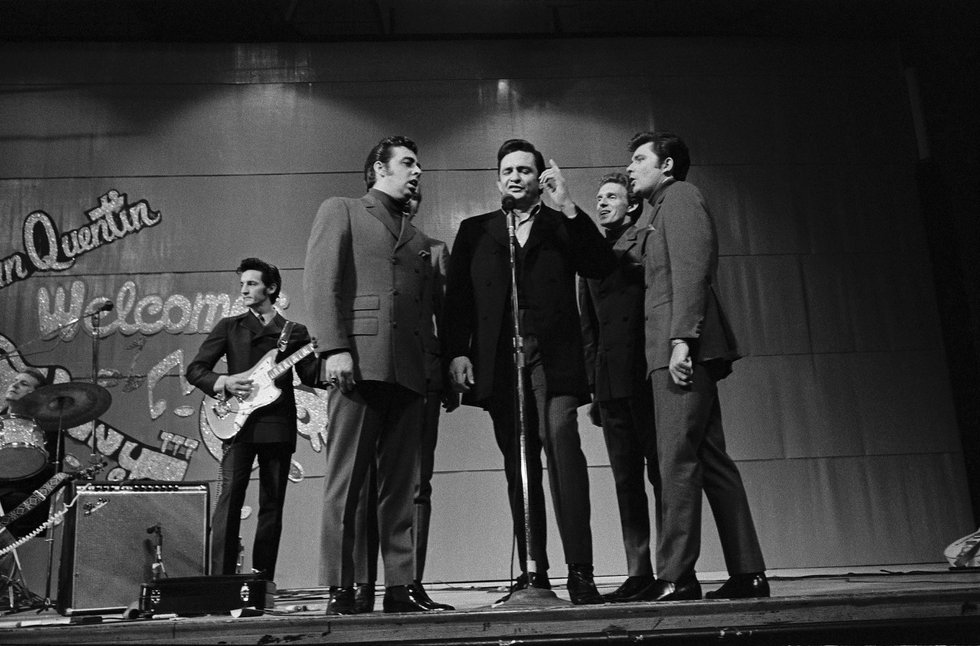For Don Reid and The Statler Brothers, it all started at a county fair.

Johnny Cash and The Statler Brothers San Quentin Prison 1969 © Jim Marshall Photography, LLC
Don Reid says the moment that changed everything for him came one day at the 1963 Roanoke Fair. His group, The Statler Brothers, had played around their hometown of Staunton for years, asking $10 per show—but often paying $10, for the privilege of playing.
Meanwhile, Johnny Cash was burning up the music charts that summer. The title track on his album, Ring of Fire: The Best of Johnny Cash, had been written by his future wife, June Carter, with Nashville Songwriters Hall of Famer Merle Kilgore. The song had flopped when Carter’s sister released it. But when Cash recorded the song, adding Mexican trumpets, it took off for number one.
On tour to promote his sixteenth album, Cash, too, had landed at the Roanoke Fair that day. When he heard the Statlers play at the Salem Fairgrounds, he hired them on a handshake. The following March, they would play their first show together in Canton, Ohio.
“John was a walkin’, talkin’, singin’ musical encyclopedia,” says Reid. For the next eight years, the Statlers toured and recorded with The Man in Black. The Cash connection paved the way to their first record deal in 1965 with Columbia Records. The label, which dates to 1889, has a star-studded catalog of artists ranging from Cash, to Aretha Franklin, Frank Sinatra, and Bob Dylan.

Their first album, Flowers on the Wall (1966), featured familiar gospel and country tunes, along with their own compositions and launched them to stardom. The title track soared up the Hot 100, hitting number two on Billboard’s Hot Country Songs.
They took home two Grammys that year: the 1965 Best New Country & Western Artist and 1965 Best Contemporary (R&R) Performance (Group)—beating out The Beatles’ “Help!” and The Supremes’ “Stop, in the Name of Love.”
Cash remained an inspiring mentor and friend. “Being with him for those years was our education in the music business. We learned what to do, what not to do,” says Reid, “and we left on the best of terms.”
A Box of Tissues

Don Reid was 14 when he joined his older brother Harold’s music group, The Kingsmen, in 1959. With Phil Balsley singing baritone and Lew DeWitt singing tenor and on guitar, the weekend quartet infused their country sound with gospel harmonies.
When another group named The Kingsmen hit big with “Louie Louie” in 1963, the four Staunton boys cast about for a new name. They were on tour, in a hotel room, when Reid’s eyes lit on a box of Statler brand tissues. The name stuck. In another era, he says, “we could have been the Kleenex Brothers.”
Twenty years after the group’s last concert, Reid says, “we still have a fan base out there. With music, you want to connect with people and create a community, and that has proved lasting for us.” Their music lives on through his son, Langdon. “My inspiration, knowledge, and passion for playing and writing came directly from my dad,” he says.
With his cousin, Wil Reid, the two formed Grandstaff in the ’90s, rebranding as Wilson Fairchild in 2012. Their 2016 album, Songs Our Dads Wrote, spotlights the songs the Reid brothers wrote together. “I was very blessed to have him show me all he could to pursue my own dreams with music,” says Langdon.
Throughout their 43-year career, The Statler Brothers garnered three Grammy and nine Country Music Association Awards. Four times, they hit number one on the Billboard Hot 100 and, in 2007 and 2008, the group was inducted into the Gospel Hall of Fame and the Country Music Hall of Fame.
A Touch of Humor

But The Statler Brothers’ appeal went beyond music. On tour with Cash, Lew DeWitt came up with a Minnie Pearl impersonation, with her trademark straw hat and a “Howdeeee!” while Harold played Tex Ritter, singing the High Noon theme song. Audiences ate it up and, throughout the ’70s and ’80s, “comedy was a big part of who we were,” says Reid. “We would host award shows and write our own scripts and comedy sketches.”
“Harold was fearless when it came to comedy,” Reid says of his brother, who died in 2020. From his vocal trumpeting on “Ring of Fire” to the impromptu birthday speech he delivered for President Jimmy Carter (“The Chief”), the Statlers built a devoted fan base with their folksy sense of humor.
When the opportunity to develop a television show came along, “we knew what we wanted,” says Don. “A variety show. People said it was old hat, but it was a big hit.” In fact, The Statler Brothers Show—which took inspiration from Johnny Carson—was the top-rated program on The Nashville Network from 1991-1998, its entire seven-year run.
The Next Creative Adventure

“I’d always wanted to write and never had the time,” says Reid. “I was working on songs all the time and traveling for 40 years.” That all changed when the band quit touring in 2002. Since then, Don has written 11 books, from The Music of The Statler Brothers: An Anthology (2020) to his most recent novel, Piano Days (2022). A story of small-town boys, the book reads like his lyrics: down-to-earth, redolent of a particular time and place, and infused with the nostalgia of childhood. And though Reid looks back on his career with a smile and a chuckle, the only singing he does now, he says, “is in church on Sunday.”
This article originally appeared in the February 2023 issue.








